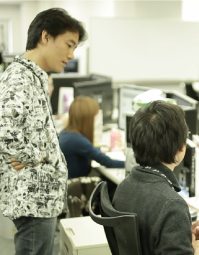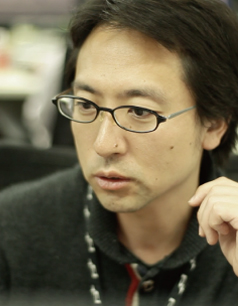(Continues from Part Two)
Inoue: To be completely honest, I`m not exactly sure what leads to a particular game`s success of failure. No matter how fun we think a game is, we can never know how the player will react when they get their hands on it. You can`t expect a game to be interesting just by throwing sophisticated tech at it, nor can you say a project was a success just because you sold a lot of copies.
Yamaguchi: Sales certainly are one metric you can use, but they should not be the sole factor you use to determine success or failure.

Inoue: The way I think about making games has changed over time, so I also try to achieve my goals at that time; though I can`t say I have some kind of grand vision. Every time we set out to make a game, I just endeavor to make it something different, and better, than what we’ve made in the past.
Yamaguchi: I hope that in the future, PlatinumGames can continue to develop the action game genre where it excels. That said, if we keep on making the same style of game over and over I’m sure I’ll get bored. Overall, I believe that each section of the company does its part coming up with new ways to keep things fresh. For me personally, however, while I appreciate the importance of the pace of action games, I’d like to try something that’s a bit more of a departure from that style. Even if it’s just through animations, I’d like to try a new way of expressing myself.
Inoue: Of all the games I’ve worked on so far, there isn’t a single one I feel completely satisfied with. Even projects I am quite happy with, if I sit down and really think about it, there are always a handful of things I wish I could have done differently. There are an endless supply of things you want to do, but the schedule doesn’t always allow for them. Sometimes you have to know when to let go and call a game finished. At the end of a project I always feel like I can take all the things that left me unsatisfied and fix them next time. But when that next project rolls around, there are still some problems I’m unable to solve…It’s a never-ending cycle. That process is also a source of motivation; a carrot just out of reach.
Yamaguchi: I also have times when I feel creatively frustrated. But thinking about how to approach the problem next time, and trying out various solutions, is the driving force that keeps me going each day. One’s job ends up making up a large part of each day; I’m happy to be devoting this time to the challenge that is game production. I enjoy my job so much that I wouldn’t want to quit even if I stopped getting paid. Despite my creative challenges, as I job I have no complaints whatsoever.
Inoue: I agree that it’s an ideal job. There are days that are so fun it doesn’t feel like work at all. That said, I do have bills to pay… Nothing would make me happier than to keep doing what I’m doing. Of course, the actual process of making games can be tough, and there is a certain weight of responsibility to ensure the players enjoy themselves. After all, in today`s society spare time is precious; the last thing we want to do is put that to waste.

Yamaguchi: I never felt this way during school, but recently I find myself really enjoying studying. For example, if we were working on a game starring animals, I’d start looking at research about biology and dissection. After that, I’d get everyone’s feedback on what I’ve made using that information. In a way, PlatinumGames is a bit like a research lab where you can experiment with the things you’ve learned.
Inoue: Studying specific things for your job is fun, right? Back in grade school I just couldn’t get excited about what I was studying, but once I got to my specialty college I realized how fun studying can be when you have a goal to apply it to a specific career.
Yamaguchi: Yes, because you are able to see the direct application of what you are studying. Part of the appeal of game development is the fact that the field is always evolving; there’s always more to learn. Being proactive in keeping your skills up to date is another necessity of being a game creator.
interview by editorial studio MUESUM (2012/06/29)